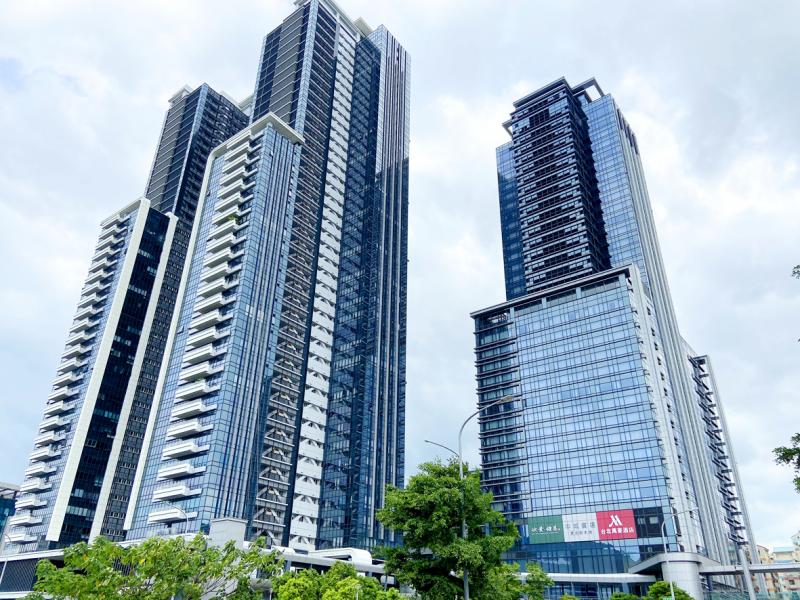Sino Horizon Holdings Ltd (鼎固開發) on Tuesday said that it has put together a team to scout suitable properties for development in Taiwan.
Sino Horizon is mainly engaged in developing and managing commercial and residential properties in Shanghai, Chongqing and other first-tier cities in China.
The company, set up by the family of ASE Technology Holding Co (日月光投控) chairman Jason Chang (張虔生), said it is considering investing NT$10 billion to NT$20 billion (US$353.3 million to US$706.7 million) in Taiwan over the next two years.

Photo: Hsu Yi-ping, Taipei Times
The firm said that it would apply for approval with the Investment Commission at an appropriate time.
Sino Horizon said that it prefers to buy idle land that could be turned into affordable residential complexes.
The company said that it aims to roll out NT$11 billion in real-estate properties and gather NT$2 billion in rental income this year.
Sino Horizon unveiled its plans at an investors’ conference in Taipei, where it reported NT$1.18 billion in net income for last year, or earnings per share of NT$0.68.
Consolidated revenue last year increased 133.9 percent to NT$13.42 billion.
The company attributed the results to pent-up demand aided by ample liquidity and low interest rates, after the COVID-19 crisis eased in China.
However, the company’s property management unit took a hit from the pandemic last year as it lowered rents to help tenants cope with the crisis, it said.
Sino Horizon said it has proposed distributing a cash dividend of NT$1.2 per share, suggesting a payout ratio of 176.47 percent.
With its shares closing at NT$39.85 in Taipei trading yesterday, the payout would represent a dividend yield of 3.01 percent.

Taiwan Transport and Storage Corp (TTS, 台灣通運倉儲) yesterday unveiled its first electric tractor unit — manufactured by Volvo Trucks — in a ceremony in Taipei, and said the unit would soon be used to transport cement produced by Taiwan Cement Corp (TCC, 台灣水泥). Both TTS and TCC belong to TCC International Holdings Ltd (台泥國際集團). With the electric tractor unit, the Taipei-based cement firm would become the first in Taiwan to use electric vehicles to transport construction materials. TTS chairman Koo Kung-yi (辜公怡), Volvo Trucks vice president of sales and marketing Johan Selven, TCC president Roman Cheng (程耀輝) and Taikoo Motors Group

Among the rows of vibrators, rubber torsos and leather harnesses at a Chinese sex toys exhibition in Shanghai this weekend, the beginnings of an artificial intelligence (AI)-driven shift in the industry quietly pulsed. China manufactures about 70 percent of the world’s sex toys, most of it the “hardware” on display at the fair — whether that be technicolor tentacled dildos or hyper-realistic personalized silicone dolls. Yet smart toys have been rising in popularity for some time. Many major European and US brands already offer tech-enhanced products that can enable long-distance love, monitor well-being and even bring people one step closer to

RECORD-BREAKING: TSMC’s net profit last quarter beat market expectations by expanding 8.9% and it was the best first-quarter profit in the chipmaker’s history Taiwan Semiconductor Manufacturing Co (TSMC, 台積電), which counts Nvidia Corp as a key customer, yesterday said that artificial intelligence (AI) server chip revenue is set to more than double this year from last year amid rising demand. The chipmaker expects the growth momentum to continue in the next five years with an annual compound growth rate of 50 percent, TSMC chief executive officer C.C. Wei (魏哲家) told investors yesterday. By 2028, AI chips’ contribution to revenue would climb to about 20 percent from a percentage in the low teens, Wei said. “Almost all the AI innovators are working with TSMC to address the

Malaysia’s leader yesterday announced plans to build a massive semiconductor design park, aiming to boost the Southeast Asian nation’s role in the global chip industry. A prominent player in the semiconductor industry for decades, Malaysia accounts for an estimated 13 percent of global back-end manufacturing, according to German tech giant Bosch. Now it wants to go beyond production and emerge as a chip design powerhouse too, Malaysian Prime Minister Anwar Ibrahim said. “I am pleased to announce the largest IC (integrated circuit) Design Park in Southeast Asia, that will house world-class anchor tenants and collaborate with global companies such as Arm [Holdings PLC],”